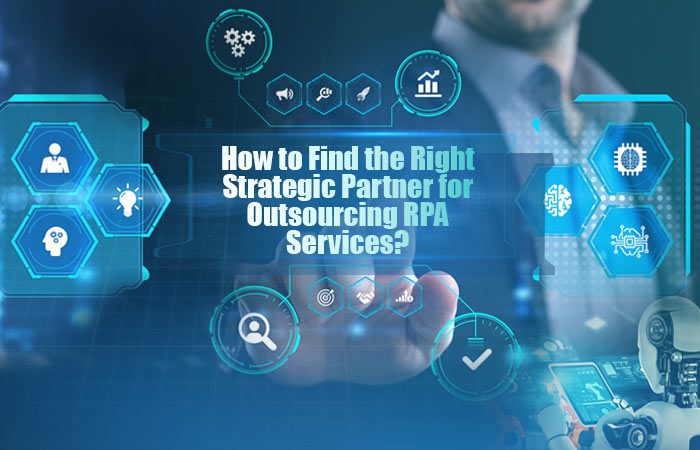
How to Find the Right Strategic Partner for Outsourcing RPA Services?
In today’s rapidly evolving technological landscape, robotic process automation (RPA) has emerged as a game-changing solution for businesses seeking to improve operational efficiency and reduce costs. As organizations increasingly recognize the value of RPA, the demand for outsourcing RPA services has witnessed significant growth.
However, selecting the right partner to outsource RPA services is crucial to ensure a successful implementation. This essay aims to provide insights into the essential factors that graduate school students should consider while finding the appropriate partner for outsourcing RPA services.
- Understanding Organizational Requirements
Before embarking on the journey of finding an RPA outsourcing partner, organizations need to have a comprehensive understanding of their own requirements. A clear understanding of the business processes to be automated, scalability needs, budget constraints, and strategic objectives will enable organizations to select an RPA partner that matches their unique needs.
- Expertise and Domain Knowledge
One vital aspect to consider while selecting an RPA outsourcing partner is their expertise and domain knowledge. The partner should possess in-depth knowledge of the industry-specific processes that require automation, as well as the RPA platforms and technologies that would best suit those processes. A partner with relevant experience will be better equipped to provide effective solutions and overcome potential challenges.
- Track Record and References
Examining the prospective partner’s track record in delivering RPA services is essential to assess their reliability and performance. Thoroughly reviewing case studies, customer testimonials, and references will provide valuable insights into the partner’s ability to successfully execute RPA projects. Moreover, seeking feedback from their previous and existing clients can help gauge customer satisfaction and identify any potential concerns.
- Scalability and Flexibility
An effective RPA outsourcing partner should have the resources and capability to handle projects of various scales. While organizations may primarily require assistance with a specific process, future automation requirements may arise as the business evolves. Ensuring that the chosen partner has the capacity and flexibility to adapt to evolving needs will ensure a long-term and sustainable collaboration.
- Security and Compliance Measures
Outsourcing RPA services entails sharing sensitive data and access to critical systems. Therefore, organizations must prioritize security and compliance measures when selecting an RPA partner. It is crucial to assess their data security protocols, compliance with relevant regulatory frameworks (e.g., GDPR), and adherence to industry best practices to ensure the protection of confidential information.
- Proven Methodologies and Best Practices
Another significant factor to consider is the partner’s approach to implementing RPA projects. A reliable partner should possess proven methodologies and industry best practices that guarantee optimal results. Evaluating their methodology, including process documentation, governance frameworks, and change management processes, will shed light on their commitment to effective project management.
- Effective Communication and Collaboration
Successful outsourcing depends on seamless communication and collaboration between the organization and the partner. Regular and transparent communication channels, project updates, and designated points of contact should be established to foster efficiency and resolve any issues promptly. Assessing their communication practices beforehand will ensure that the outsourced RPA services align with the organization’s expectations.
- Cost Considerations
While selecting an RPA outsourcing partner, organizations must carefully weigh the costs involved. Comparing the pricing models of different providers, assessing the value delivered against the expenditure, and considering long-term benefits is crucial. An optimal partner will offer competitive pricing that aligns with the organization’s budget and provides a satisfactory return on investment.
- Continuous Support and Maintenance
RPA implementation is not a one-time project, and continuous support and maintenance are necessary to ensure smooth operations. Selecting an outsourcing partner that offers post-implementation support, regular maintenance, and updates is crucial. This ongoing support will help organizations streamline the automation process, address emerging needs, and maximize the benefits of RPA technology.
- Cultural Fit and Shared Vision
Lastly, the alignment of the organization’s culture, values, and strategic vision with the outsourcing partner is vital for a successful collaboration. Businesses should consider the compatibility between their organization and the partner in terms of work ethics, communication styles, and long-term aspirations. A shared vision will foster a productive and intuitive partnership.
Finding the right partner for outsourcing RPA services demands a comprehensive evaluation encompassing organizational requirements, the partner’s expertise and track record, scalability and flexibility, security measures, methodologies, effective communication, cost considerations, support and maintenance capabilities, and cultural alignment. Taking these factors into account will help you identify and collaborate with the ideal strategic partner.

